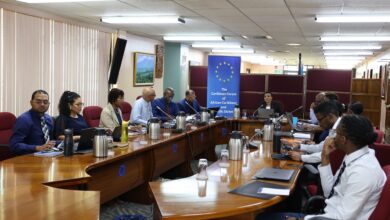(CARICOM Secretariat, Turkeyen, Greater Georgetown, Guyana) CARICOM Assistant Secretary-General Dr Edward Greene has underscored the need for gender issues to become priority on the regional agenda.
Addressing the Fifth Meeting of the Bureau of Women’s / Gender Affairs in Georgetown on Tuesday, Dr Greene who has responsibility for Human and Social Development in the CARICOM Secretariat said women were among the most vulnerable to the global economic crisis.
He pointed out that although gender inequality “has long been with us” it was likely to be intensified by the global economic crisis. Pointing to the 2009 International Labour Organization, Global Employment Trends for Women Report, Dr Greene noted that the global economic crisis would place new hurdles in the path toward sustainable and socially equitable growth, making ‘decent work’ for women increasingly more difficult.
The resultant impacts, he said, would be an increase in domestic violence, illicit drug trafficking by women and prostitution among women.
Dr Greene emphasized that the Community must respond urgently by elevating gender issues high on the regional agenda. To do so, he added, would mean underscoring the importance and the value of championing the cause of women thereby protecting poor and vulnerable groups.
He recommended the implementation of several immediate and long term measures which included: school feeding programmes, employment guarantee schemes, micro financing and other targeted social protection measures.
In addition, he said it had become necessary for Member States to engage in effective monitoring of social spending and for tracking of expenditures to ensure that the needs of women and of other vulnerable groups were being addressed during the current economic crisis.
He also encouraged the gender coordinators and directors to advocate for a more robust system of data collection, and to use data disaggregated by sex to assess the differential impacts of the financial crisis on women and men.
“We can’t afford to make mistakes because we do not have evidence based policies to address the social inequities which exist among the sexes,” Dr Greene concluded.





